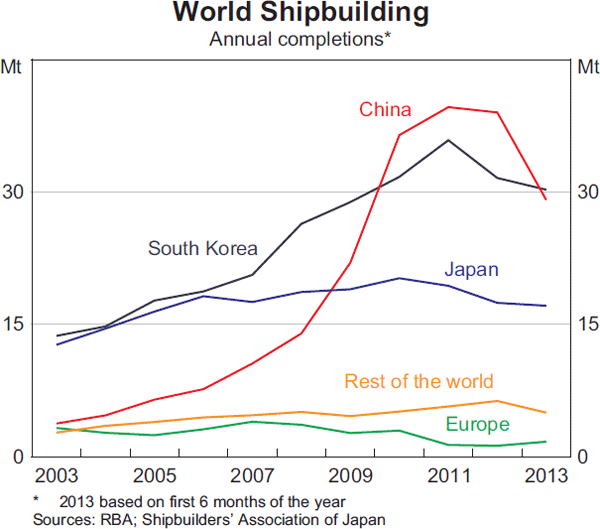- Joined
- 9 October 2009
- Messages
- 19,974
- Reaction score
- 10,460
sferrin said:We should let them build a few LHA-6s under license. I'm sure both they and Japan could find a use for them.
A global recession isn't killing South Korea either, a market overcapacity caused by a post-recession purchasing boom and subsequent massive downturn of orders is. So how does that compare to the US situation?fredymac said:I'm having trouble following your line of reasoning. Let me paraphrase: if you can be killed by a sword and then if someone else is killed by a bullet, then the sword didn't actually kill you? A global recession/depression didn't kill American shipbuilding. Something else did. If you are simply saying there are many ways to die, well yes there are. And?
TomS said:sferrin said:We should let them build a few LHA-6s under license. I'm sure both they and Japan could find a use for them.
You know they have their own indigenous design capabilities, right? Why should they build our stuff under licence when they can employ their own naval architects too?
sferrin said:Same reason Japan was over here checking out the Wasp design. The design is already done. Save them some money reinventing the wheel.
"US labor rates make building products that have high "touch" content very uncompetitive and only offsetting factors in technology can help.
A few years ago, I visited Meyer Werft in Papenburg, Germany. I was told they're still building cruise ships, partly because they're *fast*.fredymac said:I wonder how Europeans haven't been priced out of the cruise ship market? Their labor rates can't be much lower than ours.
starviking said:sferrin said:Same reason Japan was over here checking out the Wasp design. The design is already done. Save them some money reinventing the wheel.
The Japanese are interested in amphibious ship operations, but there has been no indication to date (that I am aware of) that they are interested in purchasing/building a foreign design.
Some info in this thread: http://www.secretprojects.co.uk/forum/index.php/topic,25987.0.html
sferrin said:starviking said:sferrin said:Same reason Japan was over here checking out the Wasp design. The design is already done. Save them some money reinventing the wheel.
The Japanese are interested in amphibious ship operations, but there has been no indication to date (that I am aware of) that they are interested in purchasing/building a foreign design.
Some info in this thread: http://www.secretprojects.co.uk/forum/index.php/topic,25987.0.html
I didn't say Japan was interested in purchasing/building a US design. I said, tongue in cheek, South Korea could build some if they were looking for something for their ship yards to do. And Japan HAS been looking at US gators (probably to get a better feel for what they're capable of etc.).
Moose said:A global recession isn't killing South Korea either, a market overcapacity caused by a post-recession purchasing boom and subsequent massive downturn of orders is. So how does that compare to the US situation?fredymac said:I'm having trouble following your line of reasoning. Let me paraphrase: if you can be killed by a sword and then if someone else is killed by a bullet, then the sword didn't actually kill you? A global recession/depression didn't kill American shipbuilding. Something else did. If you are simply saying there are many ways to die, well yes there are. And?
After the Vietnam War, USN shipbuilding contracts plummeted. During the immediate postwar period, however, Subsidy of Commercial sector kept shipbuilding in the US afloat despite the Oil crisis. In the latter 70s through 1980, rebound of Navy Shipbuilding and significant investment in the Domestic market (offshore oil and the Alaska crude fleet) helped the industry stabilize itself. Then, in the 1980s 4 things happened in rapid succession:
The Alaskan fleet reached capacity, ending that market
The Offshore Oil construction boom ended
Several inland fleet operators went belly-up
The Reagan Administration killed all funding for Title V, VI, and XI of the Merchant Marine Act
As a result, US Commercial shipbuilding could not endure the downturn and collapsed. South Korea likely will act sufficiently to save their industry from a broadly similar situation, because nobody in South Korea's government blames the shipyard workers for the situation or is making political hay on the idea of letting the Shipbuilding Industry die.

lastdingo said:I can't quite call overpriced warship construction "value added".
The U.S. shipbuilding is essentially limited to USN, USCG, yachts, Mississippi/Missouri shipping, Great Lakes and oil industry specialised ships. U.S. naval shipbuilding isn't competitive. U.S. warships get exported when old, not as new orders unlike French or German ones.
U.S. shipbuilding failed 100% in markets where it faced foreign competition save for Great Lakes shipping, where it competed with Canadians only.
Its shipbuilding in gross tonnage is 94% PRC, South Korea and Japan.
